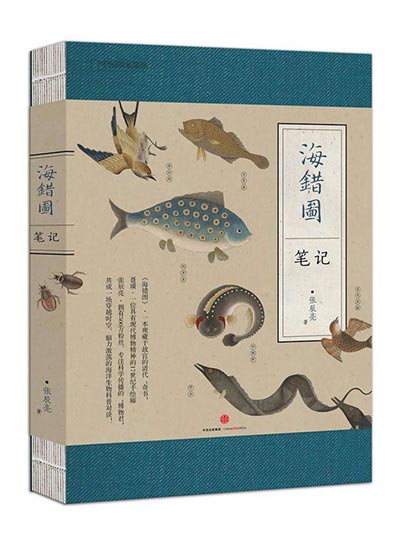It all started with bugs
 |
|
The Hai Cuo Tu Biji book cover. [Photo provided to China Daily] |
In Hai Cuo Tuo Biji (Notes on an Illustrated Handbook of Marine Animals), published by China Citic Press in November, Zhang identifies and analyzes 30 such creatures.
Zhang's book is an interpretation of an illustrated book of the same title by Qing Dynasty (1644-1911) painter and naturalist Nie Huang.
"As an introductory book, Nie's work is rich in content and vivid in pictures," Zhang says.
"However, I have noticed that there were many mistakes in the book due to the limitations of the era."
To ensure accuracy, Zhang traveled to China's eastern coastal areas, and even Japan and Thailand.
"The research and investigation process was an unforgettable experience, as I could travel and study at the same time," Zhang recalls.
His book became one of the best-sellers in the country, selling 110,000 copies over the past few months.
"Two books from two masters on natural history. When I read them, I feel like two walking encyclopedias on natural history are having a conversation," a reader comments online.
Yang Lina, a primary school teacher in Beijing, says Zhang is quite popular among her students.
"They talk about him after class and may turn to him when they encounter some questions on nature and science," Yang says.
"Zhang is more than an online celebrity. To some degree, he is an instructor that inspires children to learn about the fantastic world."
In the past decades, China has tried to popularize public science education through exhibitions, documentaries, online courses and do-it-yourself activities, with mixed results.
However, thanks to the rise of new media, science fans find it easier to communicate with each other and find they are not alone.
Given the soaring numbers of social media followers, best-selling books with science themes and even heated discussions about Zhang's posts, many believe the spring of natural history has arrived in China.
Zhang is hesitant to be that enthusiastic.
"Getting to know nature among Chinese still waits to be improved at the current stage," Zhang says.
"Therefore, there is still an uphill battle to fight before the spring really comes."
















